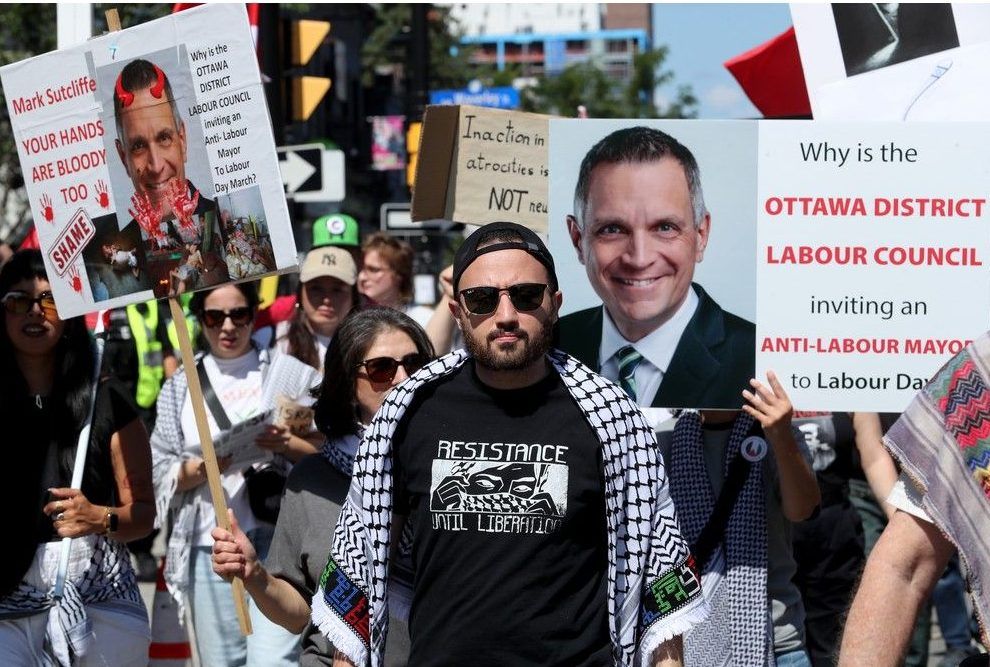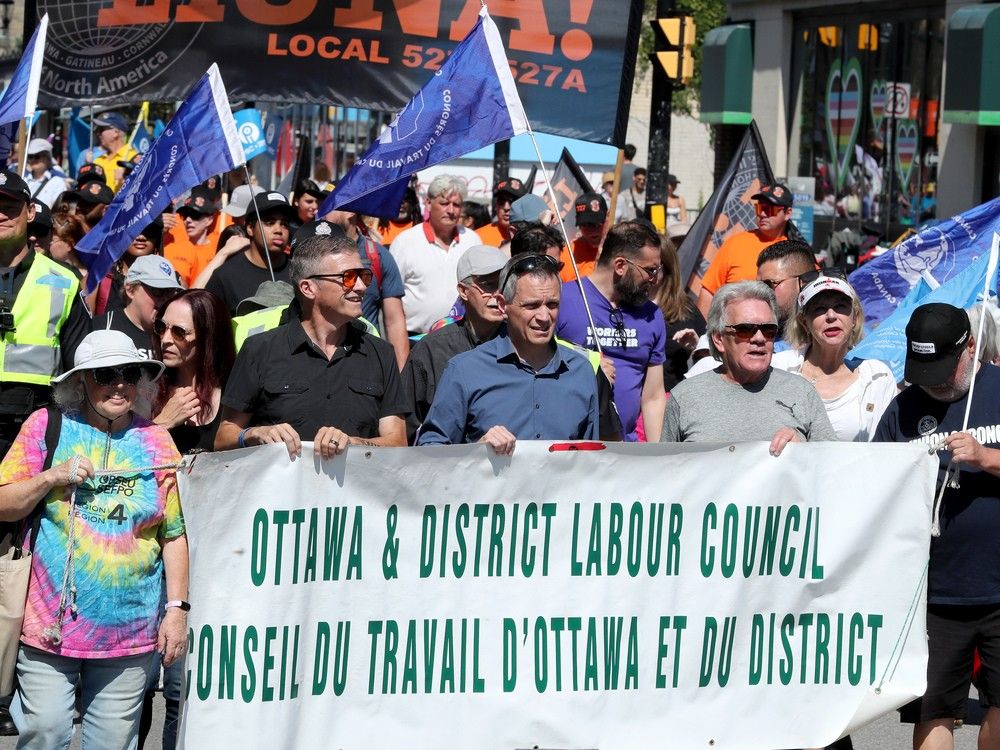Hundreds of unionized workers rallied in Ottawa on Labour Day Monday to celebrate the labour movement and
advocate for workers’ rights
.
The annual Labour Day march started at city hall at noon, and participants walked down Elgin Street before turning onto Gladstone Avenue towards McNabb Park.
Workers from unions such as the Canadian Union of Public Employees (CUPE), the Canadian Union of Postal Workers (CUPW) and the Public Service Alliance of Canada (PSAC) held up signs, flags and banners as they marched down the streets.
A marching band played music throughout the route as they guided workers to the park. One of the songs was Solidarity Forever, a labour union anthem written in 1915 by Ralph Chaplin to inspire collective action against oppressive working conditions. Many sang along, loudly belting out the lyrics as they walked down Elgin Street.
Some unions even had vehicles decked out in union swag. The Amalgamated Transit Union, which represents public transit workers across the city, drove an OC Transpo bus along the route.

Underlining the festivities, however, was a renewed call among unions to push back against government interference in labour strikes.
It comes after hundreds of Air Canada flight attendants walked off the job last month, which led to the
cancellation of hundreds of domestic and international flights
. The Canada Industrial Relations Board (CIRB) directed Air Canada to resume flight services and ordered flight attendants back to work on Aug. 16 in hopes of ending the strike and lockout after 12 hours.
CUPE defied the orders and continued to strike until a tentative deal was reached on Aug. 19.
The march also came more than a year after CUPW started negotiating a new collective agreement with Canada Post, which led to a strike that began on Nov. 17, 2024 and ended on Dec. 17, 2024. Back then, the Canadian government used Section 107 of the Canada Labour Code to order workers back to work.

“We’re marching today in solidarity with all the other unions and workers in Canada. This is the celebration of labour. And without us, things don’t happen,” said Peter Denley, national director of the central region at CUPW.
“It’s important to be out here, because I think a lot of people are concerned about the actions governments are taking in interfering in strikes, especially federally regulated workers. Section 107 is stifling the rights of people to have free collective bargaining. The government keeps saying they want people to bargain collectively, but they’ve interfered in our strikes four times.”
Denley said postal workers have been fighting for improved working conditions and job security for the past 18 months. Union members overwhelmingly voted to reject
Canada Post’s final offer that was presented in May
. Since then, talks have stalled after Canada Post rejected the CUPW’s counter-offer.

“They wanted to hear the voices of workers, and the workers said the offer is inadequate. You don’t know much about running the post office, and it’s time to negotiate. So that’s where we’re at right now,” he said.
“Where’s the minister of Public Service and Procurement, Joel Lightbound? Fact is, we need to talk to the minister responsible for Canada Post because he needs to intervene … to get Canada Post back at the table. That’s the only place we’re going to find labour peace.”
Public service workers facing uncertainty
Some participants in Monday’s march called on the federal government to stop the proposed cuts to the public service workforce.
In July, Finance Minister François-Philippe Champagne sent letters to ministers asking them to
find savings of 15 per cent
from their departments over three years. This marked the start of Prime Minister Mark Carney’s spending review, which is set to start in earnest in the next fiscal year.
Ruth Lau Macdonald, regional executive vice-president for PSAC in the National Capital Region, said members are feeling a lot of uncertainty. Many are worried they will be swept up in the next round of cuts, she said.

“There’s already evidence that government departments aren’t honouring the terms set out in the workforce adjustment appendices. We’re mobilizing around worker rights and making sure that members are educated, because we can combat that fear and that uncertainty by knowing the rules of the game and making sure that people are empowered to push back when things aren’t happening the way they should,” Macdonald told the Ottawa Citizen.
She said members are also worried about return-to-office mandates, especially after the
City of Ottawa ordered its workers to return to the office five days a week starting in January.
Premier Doug Ford applauded the city’s move,
saying the federal public service should “follow suit.”
Right now, public service workers are required to work in the office three days a week.
“We saw, between 2019 and 2023, a 4.5 per cent increase in productivity. Federal public service workers surpassed the productivity of private sector workers in that time period,” Macdonald said.
“So in this conversation around cuts, in this conversation around attrition, remote work is a cost-saving measure for the government. It can save jobs. It can ensure that resources and services continue to be there when Canadians need them.
“We’ve been saying for more than a year, since that three-day-a-week mandate came out, that we we want this to be a part of bargaining, and we want to be consulted, and we want to make sure that it’s not a one-size-fits-all model, because there are so many factors around why remote works.”
Push for collective action
There was also a push for collective action from all the unions that participated in the Labour Day march Monday.
Macdonald hopes the Labour Day march will inspire Ottawans to speak up for their rights and advocate for better working conditions for everyone.
“I want everybody to know that everybody has a word. … You should have a say. You should write to the prime minister. You should give him your thoughts. There’s a way that he should be strategically thinking of Canada, and he’s not doing that right now,” she said.
Jean-Rene Gadreau, a staff member for CUPE Local 1979, said workers need to mobilize and fight for their rights if they want working conditions to improve in Canada.
Many of the benefits workers enjoy today, like paid maternity leave, were born out of labour movements, he said.
“Remember, people, that Labour Day is about the gains that labour have allowed us to have as a society. I think it’s a nice march from the (Ottawa and District Labour Council) and it doesn’t take a lot of your time. It’s just good to be out there and with your brother and sister, and show solidarity,” Gadreau said.
“I would like to people to realize and imagine what their lives would be like without the gains that unions have allowed us to make over the past decades. … We take these things for granted. It’s good that we are thinking about them and not taking Labour Day for granted.”
Denley wants Ottawans to know that a lot of public services cannot run without unionized workers, and they should be worried that the government wants to run the post office like a private business.
“I want Canadians to know that we want to have a good, a profitable public post office that breaks even, at the very least. And a public post that works for Canadians,” he said.
“We want to work with Canada Post to solve the issues of the monetary issues. We want to make sure this is a service-driven entity for Canadians. This is not a business.”
— With files from Matteo Cimellaro
Related
- Capital Pride opens up about parade fallout, Queers for Palestine
- Citizen’s Bruce Deachman honoured for stories about homeless people



